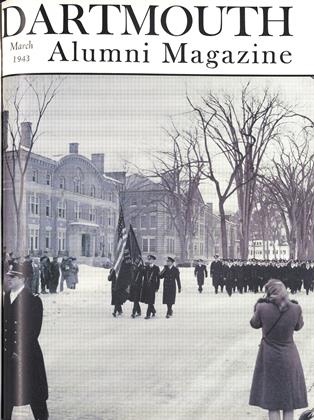Prof. Herman Feldman is the author of "Curricular Progress and Departmental Prob- lems—A Review, with comments, of the ob- jectives, offerings and program of the depart- ments of instruction, as presented in their first annual reports." This report was issued by Professor Feldman when Dean of the School of Business and Civic Administration, The College of the City of New York.
A story, "The Workmanship Has To Be Wasted," by Alexander Laing '25, which originally appeared in Harper's, has now been published in the O. Henry Memorial Award Prize Stories of 1942. This volume comes from the press of Doubleday Doran & Co.
The winter issue of the Virginia Quarterly Review contains an article by Prof. Bernard Brodie, "War at Sea: Changing Factors and Unchanging Fundamentals." The forthcoming issue of the yearbook Fighting Fleets, edited by Critchel Rimington, contains an article also by Professor Brodie on "Naval Strategy." Professor Brodie's "Layman's Guide to Naval Strategy" (Princeton University Press, 1942) has just been published in London. It has also been translated into Spanish for publication in Latin-America by Dr. Luis Delgado Gardel, Secretary-General of the Economic Advisory Committee of the Pan-American Union.
From the press of G. Schirmer, Inc., of New York, music publishers, has appeared a song "Lo How a Rose E'er Blooming," music by Praetorius arranged by Mr. David Shand of the Music Department. Mr. Shand has also arranged another piece of music by Praetorius for the song "The Morning Star."
Prof. Carl L. Wilson is the author of "The telome theory and the origin of the stamen." This article appears in the November number of the American Journal of Botany.
Craft Horizons for November 1942 contains an article by Virgil Poling, "Craft HorizonsWhat?"
Just recently the Class of 1886 has turned over to the College its well-read, extra-illustrated copy of Freeman Tilden's Better SeeGeorge. (New York, Harper & Brothers, 1941 It is a charming, amiable sort of novel which does not try to convert the reader to anything unless to a proper appreciation of its central character. Its interest to Dartmouth people lies in the fact that "George," the shrewd and genial factotum of "Stepney, N. H.," is a life portrait of Eighty-six's George Winthrop Fowler of Suncook, N. H. No man could ask to leave behind him a more sympathetic and persuasive picture. Many who did not know the original also will find it a pleasing book.
 View Full Issue
View Full Issue
More From This Issue
-
 Article
Article'Round the Girdled Earth
March 1943 By Dartmouth -
 Article
ArticlePresident Explains Navy Relations
March 1943 -
 Class Notes
Class Notes1918*
March 1943 By ERNEST H. EARLEY -
 Article
ArticleColleges Will Help Army Training Program
March 1943 By WILBUR C. MUNNECKE '27 -
 Class Notes
Class Notes1923*
March 1943 By SHERMAN BALDWIN -
 Class Notes
Class Notes1932*
March 1943 By CARLOS H. BAKER
Herbert Wells Hill.
Books
-
 Books
BooksFACULTY PUBLICATIONS
April 1919 -
 Books
BooksAND ON THE EIGHTH DAY
December 1949 By Churchill P. Lathrop -
 Books
BooksLAW AND VIETNAM.
FEBRUARY 1969 By HOWARD BLISS -
 Books
BooksCOMBAT MISSILEMAN.
June 1962 By HOWARD F. EATON -
 Books
BooksFRENCH FOREIGN POLICY DURING THE ADMINISTRATION OF CARDINAL FLEURY, 1726-1743. A STUDY IN DIPLOMACY AND COMMERCIAL DEVELOPMENT.
November 1936 By John G. Gazley -
 Books
BooksA Student's Philosophy of Religion
June, 1922 By W. H. WOOD


